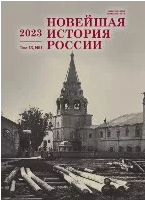Шпицберген в стратегии великих держав в годы Второй мировой войны (1939–1945)
Svalbard in the Strategy of the Great Powers During the Second World War (1939– 1945)
Author(s): M. N. SuprunSubject(s): Governance, Diplomatic history, Military history, Political history, Security and defense, WW II and following years (1940 - 1949), Fascism, Nazism and WW II
Published by: Издательство Исторического факультета СПбГУ
Keywords: Second World War; USSR; Norway; Svalbard; Polish question; оperation Unthinkable;
Summary/Abstract: The article deals with the place of Svalbard in the strategy of opposing coalitions during the Second World War in the various stages of the war. Since 1939 until the Tehran Conference, the main strategy of the Anti-Hitler Coalition had been the British strategy of “tightening the ring”. Therefore, the Arctic in the frame of this strategy was considered to be an important segment of the “ring”, and Svalbard — as the ice shore of the “channel” through which the route of the northern convoys ran, and the main battles of the war at sea took place. With the adoption of the new coalition strategy of “direct action” in 1943, the role of Svalbard changed accordingly. In the global warfare strategy, this role became auxiliary. At the same time, as the war was nearing its end, the archipelago obtained a special significance in the national defense doctrines of the circumpolar states as well as in the post-war world order, in particular, in the Soviet doctrine of “creating a belt of friendly states” and in the Norwegian strategy of “building bridges”. In accordance with the changes in the main coalition strategy and national doctrines of the Arctic states, the article examines military operations in the archipelago as well as the policy of these states towards Svalbard at the end of war. In this regard, it is noted that during those military operations not only the liberation of the Norwegian territory was accomplished but also a direct military cooperation between Norway and the USSR. On the basis of the recently declassified documents, the author examines the role of Svalbard in the constructing of the post-war Europe, in particular, in solving the so called “Polish question”, in abandoning operation “Unthinkable”, and in establishing a zone of “limited forms and purposes for military activity” in Northern Norway bordering the USSR.
Journal: Новейшая история России
- Issue Year: 13/2023
- Issue No: 42
- Page Range: 8-24
- Page Count: 17
- Language: Russian

